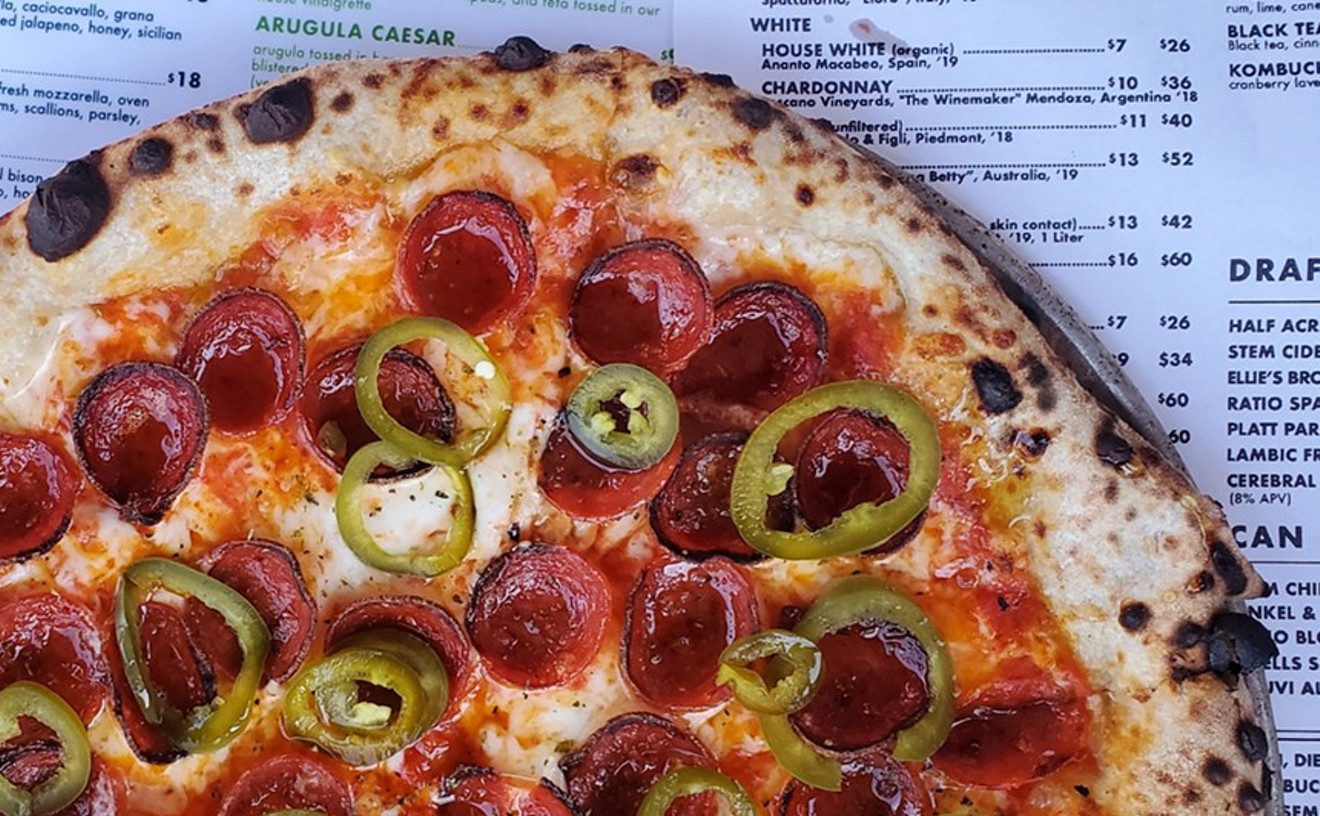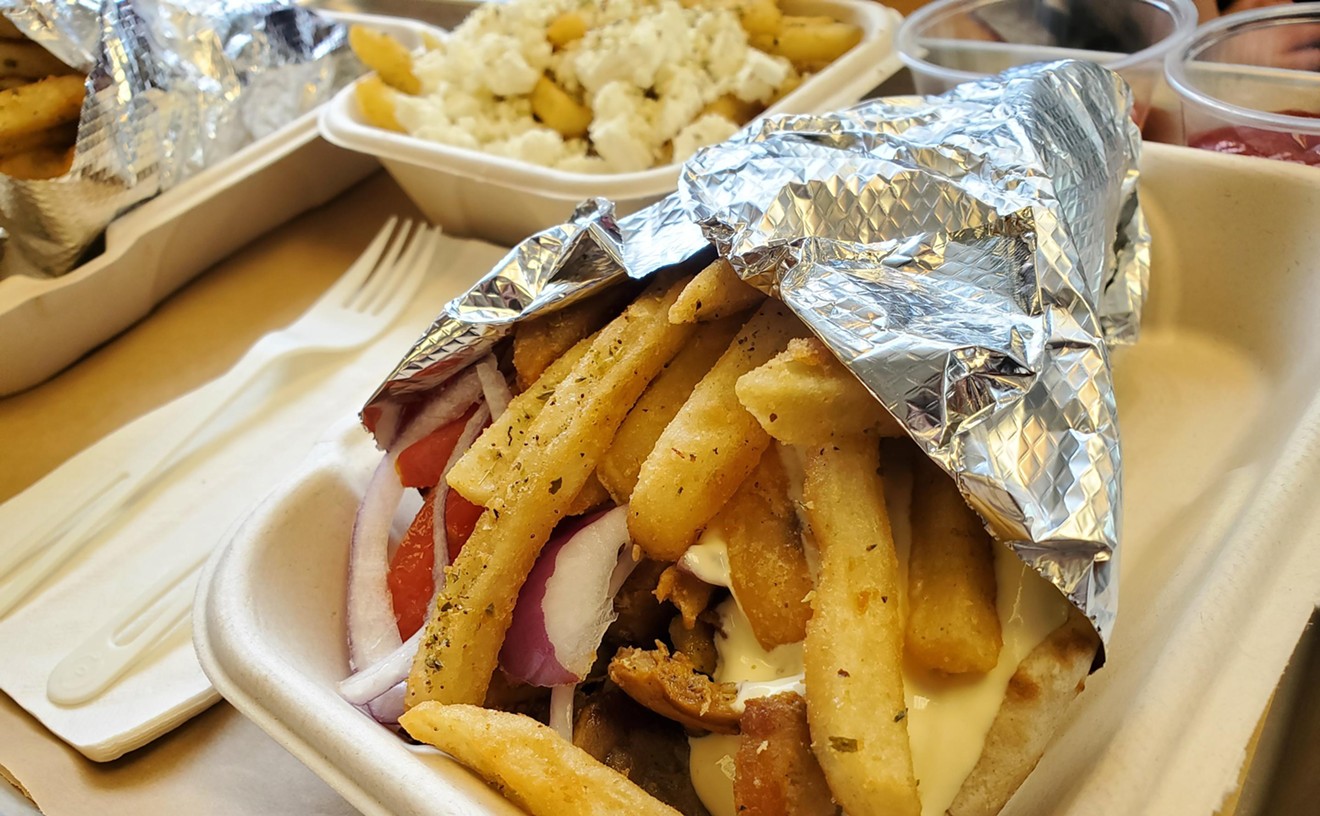I've never gotten over my instinctive dislike of traditional holidays, and instead make up my own — personal, private mileposts on the calendar with their own rituals and rites of observation, celebrated mostly alone. One such holiday landed on the Thursday right before Labor Day weekend: New Phone Book Day.
I love New Phone Book Day. First, it's an excuse to do my Steve-Martin-in-The-Jerk impression ("The new phone books are here! The new phone books are here!") that, as with all of my impressions, Laura tolerates with a steely, forced good humor. Second, New Phone Book Day is always a surprise: I never know when it's coming. These days, with so many different companies, New Phone Book Day comes four or five times a year, sometimes twice in a month, sometimes not at all for six. Finally, New Phone Book Day provides me with a host of new restaurants to investigate.
Never has a New Phone Book Day gone by when I didn't find something interesting — bizarre Indian tandoori restaurants serving pizza and tamales, time-warp strip-mall Chinese operations still offering chow mein and eggy wonton soup, Mongolian restaurants staffed by Vietnamese cooks and existing only to serve apartment complexes full of Russian or Ethiopian immigrants. This most recent New Phone Book Day was no exception. I found my unexpected gift right on page 867: Sae Jong Kwan, also known as House of Korean BBQ.
Vagaries of the telephone directory publishing industry aside, any ethnic restaurant that takes out a big ad in a phone book is trying hard to broaden its customer base. The restaurants that work solely to serve their own communities — and which, in some cases, will even go so far as to deny service to a handsome young restaurant critic on the prowl — simply won't spend the money. But the restaurants that do — that, despite an unusual cuisine, an intimidating menu and a language most commonly spoken thousands of miles away, are still willing to hang it all out there in a big phone-book ad — often have something that they're very proud of, something that they want to share not just with their own people, but with everyone.
Something like beef tongue in a paste of sesame oil, salt and pepper. Like bulgogi beef sizzling on a tabletop grill, shrimp pancakes or gomtang beef consommé. Sitting at my dining room table reading Sae Jong Kwan's menu, running my finger down the pale yellow page, I was getting hungry, excited. Gui, dakgui, soo joo — I had no idea what any of this stuff was and couldn't wait to find out. This is why I love New Phone Book Day.
I closed the book and ran out the door, headed for the heavily strip-malled, Vietnamese/Korean/American section of Havana Street where Sae Jong Kwan sits in the elbow of a long string of plazas in which you can find anything from French pastries, porno and mountain bikes to Japanese manga, shabu-shabu, Vietnamese pho, Chinese herbalists and acupuncture cures for gout. There are bars along this stretch that I've been thrown out of, pool halls I will not venture into on a bet and, in a tucked-away section near the HoneyBaked Ham store, what was about to become my favorite place in the city for Korean BBQ.
And not just for Korean BBQ. For Korean soup, for Korean fish, for Korean bacon and "black goat meat with assorted vegetables and spicy." Over the past few years, I'd driven by Sae Jong Kwan probably a hundred times, eaten at places on either side of it, but never ventured inside. From the outside, the restaurant was dark, alien, existing behind smoked glass and the (to me) impenetrable, harsh scratchings of Korean writing — a system obviously developed by someone with an intense fear of curved lines. But now, when I finally opened the door, I found Sae Jon Kwan bright, loud, full of pale wood, private booths, private rooms and crowded in a way that I found momentarily disorienting. Where were all these people coming from? How did they all know about this spot that I had overlooked?
The customers were not exclusively Korean. They were not exclusively anything. Groups of teenagers, families, huge parties of ten, twelve, sixteen, all crowded around tables pushed together to accommodate their number. There were mixed tables of Asians, Americans, college kids, a party in the back of what looked like businessmen getting weird and knocking back small glasses of beers I'd never seen before, and another party of long-haired white guys calling for more food, more food and more food.
But I was alone, and these servers weren't accustomed to solitary diners. Korean food (like the most traditional of Chinese and Thai and Vietnamese foods) is best served family-style, in large portions made for sharing. Owing to the language barrier bridged only incompletely by my hand signals and naked hunger, we engaged in a pantomime negotiation over what I could eat and what I couldn't. Short rib, okay, but not the pork and potato stew (for two only, or more) and not the honeycomb soaked in red-pepper sauce (because, maybe, the kitchen was out of it). Brisket? Brisket I could have, but I didn't want brisket. Pork belly, yes. Pork belly always yes. Unmarinated, uncured, the pork belly was slabbed, cut, laid out for me to cook on the grill in front of me. It was bacon but somehow different than bacon, bacon in a more pure, more piggish form, in the same way that the cubed rib steak marinated in Korean BBQ sauce (spicy and vaguely leafy in flavor) was like barbecue, only more.
Korean food has always confused me. The grill thing, that I get: plain meats, grilled over an open flame or thrown down against a hot cooking surface: This is peasant cuisine at its most unadulterated, street food civilized only by the addition of a roof, a waitress, some chairs. But I can't quite wrap my head around the cuisine itself — the basic mechanics of it, the flavors and spices, the seemingly willful adoption by Korean cooks of every nasty, impossible preparation. Buckwheat noodles are the hardest kind of noodle, the least glutinous, the most difficult to get right. Bean pastes and taro and tripes and tongues all require an extreme form of love and dedication to make edible. Cabbage is a tough vegetable to like even under the best circumstances, tougher still when combined with the science of long fermentation — of, essentially, the controlled rot that creates kimchi.
Over the long Labor Day weekend — my extended New Phone Book Day celebration — Sae Jong Kwan gave me a crash course in the eating of the unlovely, and I am a better, richer, more rounded man for it, even if I frequently had no idea what I was putting in my mouth. Under the generally helpful, occasionally thwarting ministrations of the floor staff, I avoided the grilled basics and delved into the soups and stews and combinations that make up more than half of the very long menu. Beef tripe with gray-brown noodles was good, but not as good as menudo to my untrained palate. Spicy crab soup was delicious; another soup, a mix of monkfish, mushrooms, whole branches of cilantro and translucent boiled cabbage, was as powerful as liquid kimchi, fiery-hot and chunky with nuggets of fish that had clenched in the broth into tiny, chewy fists of meat.
I kept trying the kimchi itself but simply couldn't find a taste for it. It was too strong, too funky, and I carried the flavor of it on my lips for hours afterward and the smell on my skin for a day. There was a slab of what might've been water-chestnut Jell-O touched with a sesame dressing, marinated mushrooms that were either nicely woody or slimy and gross depending on the day. And then there was the oxtail soup — in a thick, yellowish and clotted broth, thickened (maybe) with egg white, flavored with lemongrass and green onion — which was amazing, the meat gelatinous with fat, knuckles of bone bobbing around in my bowl like small, rocky islands of beef in a gooey sea. I'd never tasted anything like it before (except pigs' feet, perhaps), and it was so good I couldn't stop eating.
On my third visit, I opted for takeout. There was another negotiation with another waitress. She wouldn't give me the pork belly to go, claimed (again) not to have any honeycomb. Together, she and I and a second waitress were able to agree that beef-bone soup with noodles would travel well, that egg stew with pollock might, that beef and vegetable dumplings (a house special) would be fine, and that, yes, I could have another order of oxtail soup to go.
I waited, sitting at the back of the small main dining room, watching the crowds that just kept coming and coming, watching the staff change out broken burners, pulling spares from an ancient rolling cart advertising Baileys Irish Cream martinis. It wasn't until I'd taken my order to the car that I smelled something like feet, rotting onions and old meat. I'd never noticed any odd odor at the restaurant, but at home, unwrapping bags, I was hit squarely with the stink of kimchi. Laura, who'd sniffed it as soon as I came through the door, retreated upstairs.
So now, with New Phone Book Day behind me and a pissed-off wife, this is what I will remember Labor Day weekend 2007 for: the hunger for new, inexplicable things, the joy of discovery, the taste of oxtail, and a smell that I just can't shake.
Like I said, I'm no good at holidays.










